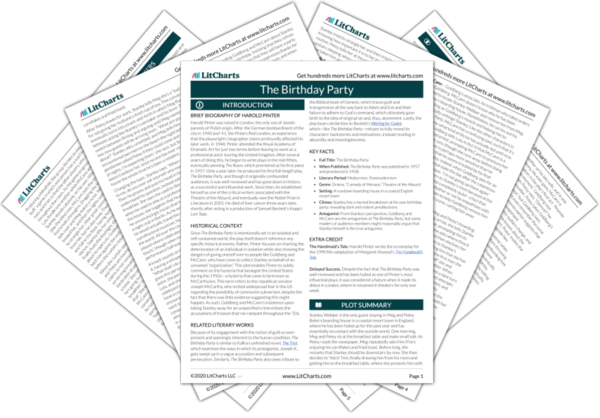Ambiguity, Meaninglessness, and Absurdity
Very few details are straightforward or verifiable in Harold Pinter’s The Birthday Party, a play about a spontaneous birthday party that quickly turns dark. In fact, most of what the characters present as fact is later contradicted or ignored. For instance, personal histories are frequently ambiguous, as characters like Goldberg and Stanley Webber tell conflicting stories about their own pasts. Indeed, there is so much flexibility in The Birthday Party that even the names…
read analysis of Ambiguity, Meaninglessness, and AbsurdityGuilt and Transgression
Throughout The Birthday Party, Pinter portrays Stanley as a character saddled with guilt. Indeed, he casts Stanley as a man with a potentially unsavory past, one he’s eager to leave behind by moving into Petey and Meg’s boarding house. Unfortunately, he’s unable to escape his previous life when Goldberg and McCann arrive at the boarding house and hold him accountable for whatever it is they think he’s done. Interestingly enough, though, they never…
read analysis of Guilt and TransgressionOrder, Chaos, and Sanity
In The Birthday Party, Meg adheres to a strict daily routine, one that imposes a pattern not only onto her own life, but onto the entire boarding house. In fact, she devotes herself so wholeheartedly to establishing this sense of order that she forces others—like Stanley—to play along. For Stanley, this commitment to order is perhaps stabilizing, considering that he only starts to go crazy once Goldberg and McCann disrupt the regimented world…
read analysis of Order, Chaos, and Sanity
Isolation, Freedom, and Independence
In The Birthday Party, Stanley Webber lives for a year in isolation in order to hide from his past. As he holes up in Meg and Petey’s boarding house, he presumably enables himself to lead the life he wants without having to reckon with whatever it is he did that forced him to disappear in the first place. However, Pinter spotlights the detrimental effects of isolation on Stanley’s quality of life, going out…
read analysis of Isolation, Freedom, and Independence






